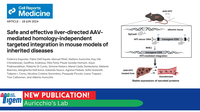Safe and effective liver-directed AAV-mediated homology-independent targeted integration in mouse models of inherited diseases
Authors: Federica Esposito, Fabio Dell’Aquila, Manuel Rhiel, Stefano Auricchio, Kay Ole Chmielewski, Geoffroy Andrieux, Rita Ferla, Paula Sureda Horrach, Arjun Padmanabhan, Roberto Di Cunto, Simone Notaro, Manel Llado Santeularia, Melanie Boerries, Margherita Dell’Anno, Edoardo Nusco, Agnese Padula, Sofia Nutarelli, Tatjana I. Cornu, Nicolina Cristina Sorrentino, Pasquale Piccolo, Ivana Trapani,
Toni Cathomen, and Alberto Auricchio
Year: 2024
Sources: Cell Reports Medicine
Abstract:
Liver-directed adeno-associated viral (AAV) vector-mediated homology-independent targeted integration (AAV-HITI) by CRISPR-Cas9 at the highly transcribed albumin locus is under investigation to provide sustained transgene expression following neonatal treatment. We show that targeting the 3′ end of the albumin locus results in productive integration in about 15% of mouse hepatocytes achieving therapeutic levels of systemic proteins in two mouse models of inherited diseases. We demonstrate that full-length HITI donor DNA is preferentially integrated upon nuclease cleavage and that, despite partial AAV genome integrations in the target locus, no gross chromosomal rearrangements or insertions/deletions at off-target sites are found. In line with this, no evidence of hepatocellular carcinoma is observed within the 1-year follow-up. Finally, AAV-HITI is effective at vector doses considered safe if directly translated to humans providing therapeutic efficacy in the adult liver in addition to newborn. Overall, our data support the development of this liver-directed AAV-based knockin strategy.
Category: journals

